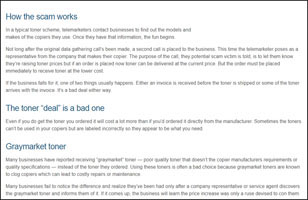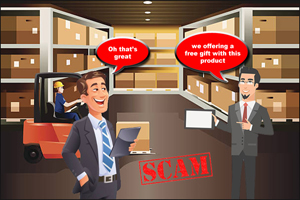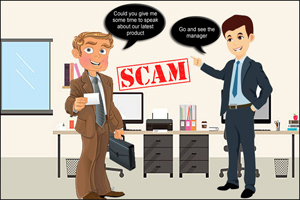Office Supply Scams
Protect your business from office supply scams with our guide. Identify and prevent fraudulent transactions, enhance office security, and raise awareness about the risks of dealing with bogus suppliers. Prioritize the safety of your online purchases and fortify your defenses against office fraud.
The Deceptive Tactics Employed by Fraudulent Suppliers:
Scams manifest in various guises, aiming to part you from your money and personal information, leaving you financially compromised. While scammers frequently target students, household members, and the elderly, one demographic particularly susceptible to the deceitful ploys of con artists is business groups, especially small and startup enterprises. A prevalent scheme within this realm is the office supply scam, strategically designed to create confusion surrounding product invoices and shipments, coercing organizations into paying for unordered goods or exceeding agreed-upon bids.
These supply scammers often operate from makeshift offices known as boiler rooms – temporary setups equipped with easily disassembled desks and telephones. The clandestine nature of these operations adds an additional layer of complexity, making it challenging for businesses to detect and defend against such fraudulent activities.
Businesses must remain vigilant and implement robust safeguards to protect themselves from falling victim to these manipulative tactics. This includes adopting stringent verification processes for invoices, thoroughly reviewing supply orders, and fostering awareness among employees to recognize and report any suspicious activities.
Modus Operandi of the Office Supply Scam:
The office supply scam unfolds through a calculated series of actions, typically commencing with a call to an unsuspecting employee within a company. The scammer skillfully creates an illusion that an order for office supplies has been placed by the purchase control team. Exploiting the trust established with the employee, the scammer proceeds to manipulate gaps in the organization's purchasing procedures, ultimately leading to the procurement of overpriced, substandard goods, or items never initially ordered.
Office supply phone scams commonly manifest in three predominant scenarios:
- Fake Invoice Scams: Scammers generate fabricated invoices, deceiving organizations into making payments for goods they did not order.
- Extra Payment Scams: Manipulating payment processes, scammers coerce businesses into making additional payments beyond the agreed-upon amount.
- Gift Horse Scams: Exploiting the guise of a gift or promotional offer, scammers lure organizations into accepting unsolicited supplies that may be overpriced or unnecessary.
Guarding against these scams requires organizations to implement stringent verification procedures, educate employees about potential threats, and establish clear protocols for validating and approving supply orders. Vigilance and awareness are key in thwarting the deceptive tactics employed by these fraudulent suppliers.
Fake Invoice Scams Unveiled:
Operating under the guise of a trusted supplier, scammers executing fake invoice schemes approach unsuspecting employees with a convincing narrative. They claim that the account department of the targeted firm has encountered issues with their company details and purchase order information. Throughout the interaction, these deceptive operators skillfully extract personal information about the individual on the other end of the line, alongside key details about the company.
If the employee becomes convinced and divulges details such as their name, employee ID, and the company's address, the scammers capitalize on this information. They proceed to craft a fraudulent invoice and dispatch it to the company. In more egregious cases, these fraudsters may substitute the name of the person they spoke with for the "authorized buyer" on the invoice, potentially implicating the unsuspecting employee for unordered merchandise within the company.
Defending against these scams necessitates heightened employee awareness, stringent verification processes for invoice authenticity, and proactive measures to safeguard personal and company information. By fortifying defenses against fake invoice scams, organizations can shield themselves from falling victim to these deceptive practices.
Unveiling Extra Payment Scams in the Office Supply Arena:
Extra payment scams have become prevalent in the realm of office supply scams, particularly in Canada. Fraudulent suppliers employ a deceptive approach, presenting themselves as prospective business partners eager to engage with your company. Once a deal is struck, they secure an order based on an initially quoted price.
However, when it comes time for delivery, these scam suppliers exploit the situation by charging an additional amount. They claim that, during the order placement, only the cost of the goods was initially specified, omitting service and transportation charges. This cunning tactic allows the scammers to extract extra funds, deceiving companies into unwittingly overpaying for their supplies.
Businesses must remain vigilant and implement thorough verification processes during the procurement of office supplies. Scrutinizing quotes, clarifying all associated costs upfront, and fostering awareness among employees are essential steps in safeguarding against extra payment scams. By staying informed and proactive, companies can mitigate the risks posed by these deceptive practices.
Unwrapping the Deceptive Layers of Gift-Horse Scams:
Gift-horse scams involve a cunning strategy where scammers seek to gain favor with a company's purchasing control employee by sending seemingly innocuous free gifts or promotional items. This initial act of generosity lays the foundation for a manipulative relationship wherein the fraudsters subtly introduce references to their merchandise or services.
Exploiting this established rapport, the scammers proceed to send subpar quality supplies to the company, often at exorbitant prices. This deceptive practice creates a perilous situation for the targeted organization, hindering its growth potential. A report by the Federal Trade Commission (FTC) highlights the prevalence of these gift-horse scams, particularly in the United Kingdom.
Businesses need to exercise caution and implement robust measures to identify and counteract such schemes. Educating employees about the potential risks associated with unsolicited gifts, reinforcing stringent procurement processes, and staying informed about prevalent scams are essential steps in fortifying defenses against gift-horse scams.
Strategies to Safeguard Against Office Supply Scams:
Protecting your organization from the clutches of office supply scams requires strategic measures and heightened awareness. Consider the following proactive steps:
- Establish a Robust Purchase Control Team: Form a dedicated and trustworthy purchase control team, limiting procurement authority to selected, reliable members. This measure ensures a stringent oversight of purchasing activities, reducing the vulnerability to scams.
- Stick to Regular Suppliers: Prioritize dealing with established and trusted suppliers rather than succumbing to enticing offers from unknown entities. Recognizing and maintaining relationships with reliable suppliers can safeguard your organization from potential scams.
- Exercise Caution with Alluring Gifts: Be wary of suppliers offering alluring gifts or promotional items with purchases. While these may seem tempting, they can be a tactic used by scammers to establish deceptive relationships. Scrutinize such offers carefully before engaging.
- Promptly Report Suspicious Calls: If you receive any suspicious calls regarding order placements, escalate the matter to the higher authorities within your company instead of continuing the conversation. Reporting promptly can prevent potential scams from progressing further.
By implementing these strategies and fostering a culture of awareness within your organization, you can significantly reduce the risks associated with office supply scams and safeguard the integrity of your procurement processes.







